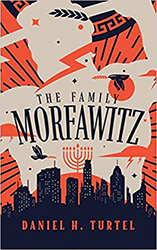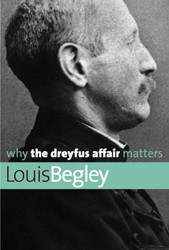
Alfred Dreyfus as a prisoner on Devil’s Island, 1898
By now, the portion of the world that is interested in truth knows this: on October 17, an errant rocket, fired from within Gaza, struck a parking lot, tragically killing the Palestinian civilians who were sheltering there. Unfortunately, the wheels of propaganda move quickly, and this has put into motion protests and riots across the Middle East, Western Europe, and many American cities and college campuses.
This is the response that Hamas counted on when it peddled its falsehood to a world eager to find fault with Israel. To be enraged by Hamas reports of an Israeli airstrike’s destruction of a hospital — and of 500 people dead or trapped beneath rubble — is a reasonable emotional response; to maintain that rage towards Israel when, in daylight, it is clear that the hospital in question has not been reduced to rubble, is barely damaged, and that all evidence makes clear that the tragic loss of life was a result of rocket misfire from within Gaza… well, that’s something else entirely. It’s a familiar “something else.”
To let negative fictions inform one’s opinion, and disregard positive truths when they dissent, is a transparent means of justifying biased hatred.
This is a response that I had to have on hand when I received criticism for my second novel’s portrayal of Jewish characters. The Family Morfawitz is not a story about Jews being good; it’s a story in which a family of Holocaust survivors stand in for the Greco-Roman pantheon and play out a modern retelling of Ovid’s Metamorphoses. The Morfawitz family members – like the Metamorphoses characters on which they are based – are horrible, cruel, and self-centered, and some readers and critics alike suggest the novel’s potential to reinforce antisemitic stereotypes. I found this absurd, and noted in one interview that nobody read Wuthering Heights and concluded that all the English are horrible, and that it would be similarly unlikely for an informed reader to extrapolate from a book about Jews being bad that all Jews somehow are. Moreover, I felt that it should not be the job of the Jewish fiction writer to dispel ancient stereotypes, or let a fear of them affect one’s work; for if it’s true that people are swayed by fiction, they are also swayed by reality, and they are generally curious enough to want to distinguish between the two.
In light of recent events, this seems naive. It also should have seemed naive in light of past events. Specifically, the disillusionment with American progressivism that liberal Jews worldwide are now experiencing recalls the disillusionment experienced by Theodore Herzl while covering the Dreyfus Affair — a disillusionment which birthed the modern Zionist movement.
In 1894, the French Artillery officer Alfred Dreyfus was baselessly convicted of selling French military secrets to the Germans. Dreyfus, an Alatian of Jewish descent, was sentenced to life imprisonment on the penal colony of Devil’s Island. Less than two years later, new evidence identified the true spy, but this evidence was suppressed by senior military officials. Not only did they knowingly acquit the true culprit, but they then forged additional documents to bring new charges against Dreyfus.
Emile Zola’s “J’Accuse…!” took up Dreyfus’s cause, stating that — had Zola failed to do so — his “nights would otherwise be haunted by the spectre of an innocent man, far away, suffering the most horrible of tortures for a crime he did not commit.” Zola’s letter then goes on to describe the affair in detail, and ends with nine accusations against those who he felt were complicit in the gross miscarriage of justice.
While Herzl no doubt agreed with Zola’s accounting for the facts, his conclusion was more fatalistic. “Above all,” he wrote in his diaries, “I recognized the emptiness and futility of trying to combat antisemitism.” While the French Zola wanted to fight to make the truth known, Herzl understood something more sinister: the truth was known, it simply was not important. To an establishment that found it convenient to find fault with a Jew, exonerating evidence was a danger that could not be allowed to see light.
The Ahli Arab Hospital incident is the Dreyfus Affair of our time. Initial reports blamed Israeli airstrikes for the explosion, parroting Hamas’s unsubstantiated claims. Their sources were noted as “Palestinian officials,” or “Health ministry officials in Gaza,” without explaining that both of these refer to Hamas. It did not take two years, as it did in Dreyfus’s case, for the counter-evidence to pour in, but by that time the damage was done.
The term “useful idiot” was coined by Lenin to describe “naive or credulous persons who can be manipulated or exploited to advance a cause or political agenda.” It’s been thrown around in the aftermath of this reporting, but that’s a flawed and careless designation of the behavior it seeks to describe. Trusting a Hamas report, when none others exist to refute it, pushes naivety to its extreme limit; failing to clearly and unequivocally correct one’s public condemnation of Israel, when irrefutable evidence comes to light, exposes an agenda that cares for neither Palestinian lives nor truth when they get in the way of condemning Jews.
Those today who are compelled to speak the truth, as Zola was, by the knowledge of the violent horrors unleashed on Jews when such falsehoods rot in public, are being drowned out by louder voices. Zola’s list had nine accusations; ours is longer, and possibly endless if some reckoning with truth were going to be satisfied. But while the list of complicit entities is inexhaustible, one might find that Jews themselves are quite exhausted. Exhausted by the pretense that a “Clean the World” sign with a Jewish star being disposed of is a comment on social justice; exhausted of hearing that the tearing down of “Kidnapped” signs is somehow rooted in resistance to colonialism; exhausted of assurance that calls of “Gas the Jews” are freakish, one-off incidents; exhausted of trying to justify how a leading publication could really expect impartial reporting from a freelancer who has a history of praising Hitler.
In place of our Zola-like quest to scream the truth to a mob that does not want to hear it, Jews might reasonably lean towards Herzl’s grim evaluation: the futility of attempting to combat antisemitism with reason. We can only hope that our assessment will not be as prophetic.
Daniel H. Turtel is the author of the novels The Family Morfawitz and Greetings from Asbury Park, winner of the Faulkner Society Award for Best Novel. He graduated from Duke University with a degree in mathematics and received an MFA from the New School. He now lives in New York City.



